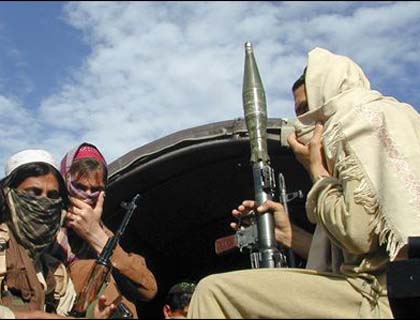As the international troops are set to withdraw from Afghanistan by 2014, what is likely to take place, sooner or later, is a political settlement with Taliban. Political pundits maintain if the United States is to get rid of Afghan war and portrait it as a triumph to the world, there is a need for a political solution. If other words, prolonging its involvement in Afghanistan - keeping in view the economic and political pressures and the next presidential election in US - is becoming a tough job for Obama administration.
Reportedly, the US has, secretly, held several sessions of talks with Taliban leadership. Most probably, the Karzai administration has been kept in dark and the US has had no consultation with President Hamid Karzai on the issue. This is signaled by the concern expressed by Karzai office recently. Last week a spokesperson to Karzai's office said, "We oppose any kind of negotiations where delegation or delegations of Afghanistan have no leading role and emphasize that any kind of negotiations must be led by Afghans."
According to US officials, the US held has held about half a dozen meetings with their insurgent contacts, mostly in Germany and Doha with representatives of Mullah Omar, leader of the Taliban's Quetta Shura. Unnamed US officials have told Reuters, that talks with Taliban have reached a turning points. A report published by Reuters says, "The United States is considering the transfer of an unspecified number of Taliban prisoners from the Guantanamo Bay military prison into Afghan government custody." This step is being considered to bolster the Taliban trust and will give them the confidence of negotiating a deal with Afghan government directly and publically.
Recently, there have reports in Afghan and international media on establishment of an office for Taliban in Qatar. But Karzai recalled Afghan ambassador in Qatar as he fears that the US is not keeping Afghanistan in picture. Karzai met last week with senior leaders including former Mujahideen commanders, religious figures and top government officials, to discuss the future of talks. The group agreed that any Taliban office should ideally be in Afghanistan, but if that was not possible, it said, other countries – Turkey or Saudi Arabia - would make a better location than Qatar.
Although Abdul Salam Zaeef, Taliban's former ambassador to Pakistan has signaled unawareness on establishment of office for Taliban, Arsala Rahmani, a senior member of Afghanistan's High Peace Council told Reuters on Sunday: "What we heard from senior Taliban commanders and their relatives, is they agreed on a political office.It would be better to establish one inside Afghanistan if the situation allows."
The US on other hand has set certain conditions for helping Taliban establish an office. If the effort advances, one of the next steps would be more public, unequivocal U.S. support for establishing a Taliban office outside of Afghanistan. U.S. officials quoted by Retuers have said they have told the Taliban they must not use that office for fundraising, propaganda or constructing a shadow government, but only to facilitate future negotiations that could eventually set the stage for the Taliban to reenter Afghan governance.
A newly formed political party, National Front, has also announced its support to establishment of an office for Taliban. An office would help Taliban to talk from a clear address. Taliban office, if established, should be considered a development in talking a deal with Taliban.
The reports on talks with Taliban should be seen with optimism. Wars ultimately end with negotiations. But certain points still go unclear. How come the Taliban, who have always remained stuck to the point that they would not negotiate in the presence of foreign troops, negotiated with a country that they have been pronouncing as the greatest enemy of Muslims in the world. Implementation of Sharia law instead of Afghan constitution and complete withdrawal of NATO forces form the major conditions of Taliban for negations.
They assassinated Afghanistan's peace envoy, Burhan ud Din Rabbani that resulted in collapse of all efforts of Karzai administration to involve Taliban in table talks. Afghans only allows peace deal with Taliban, if the ten-year gains – in freedom of speech, media and women rights and other economic, social and democratic developments - of Afghanistan are secured. The Taliban have to show willingness for obeying the constitutional law of Afghanistan and there should be no power-sharing with them. But Taliban's response is still missing.
Since the past two years both government of Afghanistan and the international community have been emphasizing on a political way for resolving the Afghan conflict. The US, as said, has had several secret meetings with Taliban in the past ten months. Nonetheless, there is no clear and transparent peace process policy on hand.
A clear strategy is the Afghans have being stressing on since long. Despite so much publicity about peace reconciliation with Taliban, the Karzai administration fails to present any clear idea on how the process of peace will go on. Same is the case with talks held between America and Taliban representatives. The talks have not only been highly secretly held but also, but also there is no clear information on what grounds form the basis of these talks.

